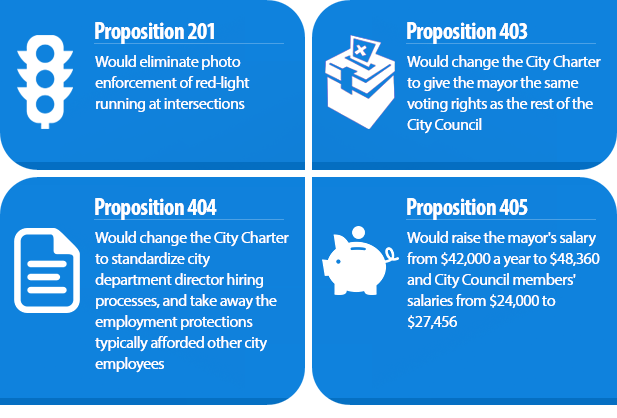Tucson voters will decide four ballot questions in this fall’s election, three prompted by committees the City Council created, and one initiated by a voter.
On Metro Week, the proponents of three of those issues talk about why they are on the ballot in the first place, and what they would do.
There is no formal opposition to any of the measures.
Proposition 201: Traffic Cameras
A yes vote: would ban photo radar, or photo enforcement of traffic laws, in Tucson.
A no vote: would allow the systems to continue operating in the city.
This ballot initiative came from Tucson voters who gathered signatures to bring it to a public vote.
Former state lawmaker John Kromko tried to get it on the Tucson ballot in years past, and in the meantime, the state stopped using photo enforcement on highways, and Pima County took its photo systems off unincorporated roads.
“They’re a scam. They’re unfair,” Kromko said, because they catch drivers who ran a red light by fractions of a second. Those are violations an officer would not cite someone for, he said.
The legal definition of an intersection is where the curb ends, and Kromko said most drivers don’t know that. He said many people think they enter the intersection at the crosswalk, yet they may still have 20 or 30 feet farther to travel before they are in an intersection. By the time they travel that distance, the light could be red, he said.
Tucson has eight intersections with cameras installed to detect red light running and speeding. It also has two mobile vans that enforce speeding in various locations every day.
Listen to a radio story about City Charter changes:
Proposition 403: Mayor Vote
A yes vote: would give the Tucson mayor the same voting power as the rest of the City Council.
A no vote: would retain the present voting system, in which the mayor can vote on fewer issues than the rest of the City Council.
This ballot initiative came from the Charter Review Committee, which the City Council created to suggest changes to the city’s governing document. The committee suggested the change and the council referred it to the ballot.
“In the charter that was developed in 1929, the mayor was actually disadvantaged in terms of voting,” said Steve Lynn, a supporter of the change and member of the Southern Arizona Leadership Council.
The change should have been made long ago, he said.
“It’s really important to have the person who is nominated and elected city-wide to have the same authority as the rest of the council,” Lynn said.
All charter changes must get voter approval.
Proposition 404: Hiring Department Directors
A yes vote: would standardize city department director hiring and firing processes.
A no vote: would keep the system as it is now, with some department director appointments made by city council, and some by the city manager.
This initiative eliminates what Lynn called a “patchwork” system for department director employment decisions.
“Some are voted on by the City Council, some are decided by the City Council, and some it’s a hybrid,” Lynn said.
Most department heads work for the city manager, so it makes sense for them to report directly to the manager and be accountable to him, Lynn said.
This ballot initiative came from the Charter Review Committee.
Proposition 405: City Council Raises
A yes vote: would raise City Council members’ annual salary to $27,456, and would raise the mayor’s pay to $48,360.
A no vote: would keep the City Council members’ salaries at $24,000 a year and would keep the mayor’s salary at $42,000 a year.
The City Council opposed this measure, but it went to the ballot on the recommendation of a citizen’s salary commission.




By submitting your comments, you hereby give AZPM the right to post your comments and potentially use them in any other form of media operated by this institution.